Dental Crowns Lakewood
Giving Teeth the Protection They Need to Thrive
Dental crowns are by far some of the most common dental restoration services provided. This is not only because they are easy to make but because they are incredibly versatile. Crowns are capable of solving a wide variety of dental issues. Whether your tooth is cracked from trauma or decay, or it is discolored or misshapen due to staining or other circumstances, a dental crown in Lakewood can restore its appearance and function. Thanks to CEREC technology, we can even have your crown fabricated and placed all in one visit, saving you time and money overall.
Dr. Vinnie is prepared to make sure your crown fits just right and protects your teeth for many years to come. Don’t wait to get one placed if you need one; contact our office today to get started!
Why Choose Lakewood Complete Dentistry for Dental Crowns?
- Advanced CEREC Dental Technology for Faster Results
- Dentists Committed to Delivering Comfort & Patient-Focused Care
- We Provide Multiple Payment Options for Dental Patients
What Is a Dental Crown?
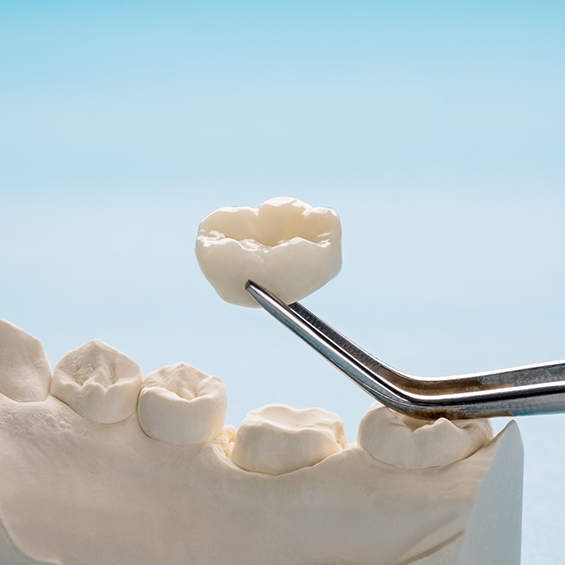
Dental crowns are restorations that fit over existing teeth that have been damaged to the point where it affects their natural function. When a tooth is damaged, it doesn’t only make it more difficult to eat the foods you want or cause significant discomfort, but it can also put your tooth at higher risk of infection. Cracked teeth expose the inner tooth where the vulnerable pulp sits. If bacteria reach the pulp, it can easily trigger an oral infection and cause higher dental costs and more headaches later.
What Can Dental Crowns Fix?
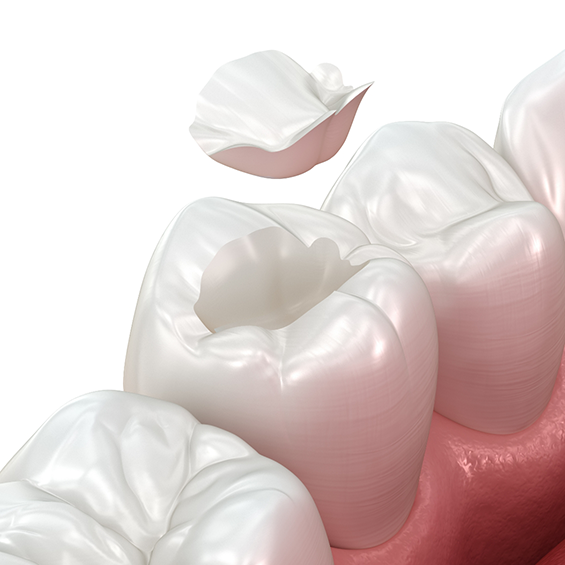
If a tooth is so damaged that a dental filling isn’t enough to repair it, a dental crown is the next option to consider. This is particularly true if the filling were to take up more than two-thirds of the remaining tooth. Other than repairing large cavities, dental crowns are ideal for:
- Replacing portions of a broken tooth
- Completing a dental bridge
- Holding a tooth together
- Restoring a dental implant
- Improving the appearance of teeth (covering chips, cracks, discoloration, or misshapen teeth)
How Are Dental Crowns Made?
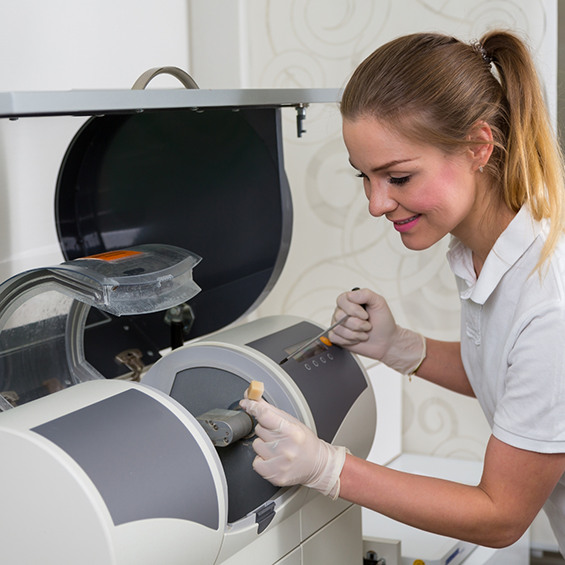
Dental crowns can be made from several different materials, including gold, porcelain, and zirconia. The material you choose will depend on your needs, but all are capable of restoring the overall function of your tooth. After examining your tooth and removing any decay or damaged tissue, we will remove a minimal amount of enamel to make room for the restoration. Then, we’ll take multiple images of your tooth and use that data and the CEREC same-day dental restoration system to design and fabricate the crown entirely in the dental office.
Once the crown is made, we’ll put it in place and confirm that your bite is even and that the crown has effectively sealed your tooth. Once complete, your crown should last you many years as long as you practice daily oral care and visit our office regularly for checkups and cleanings.
We hope you call Lakewood Complete Dentistry for your next dental crown placement. Schedule your appointment and speak with one of our talented dentists yourself!
Understanding the Cost of Dental Crowns

Once you’ve heard that you need a dental crown to rebuild your tooth’s functionality and enhance its appearance, you probably want to know how much it costs. We can’t give you an estimate until your consultation because the pricing depends on your unique circumstances. After Dr. Artino has examined the tooth in question, we’ll gladly provide a detailed quote and walk you through it for your approval before we proceed.
Continue reading to learn how the rate of your dental crown is determined, and feel free to contact us for additional information.
Factors That Affect the Cost of Dental Crowns
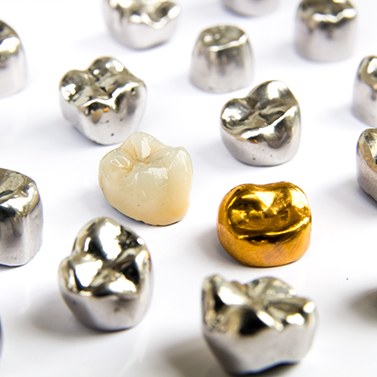
There are a few different considerations that can influence the total amount owed for your restoration, such as:
- Your dental condition. If you need additional treatments, like fillings, a root canal, or gum disease therapy, you must pay for each service.
- The type of material used. These prosthetics can be made of metallic amalgam, gold, resin, or porcelain, which can increase or decrease the cost.
- How it’s created. Traditional dental crowns are built at a special dental laboratory, which might accrue additional expenditures over same-day restorations milled onsite with CEREC technology.
Opting for the least expensive options can be tempting when the dollar amount is your top priority. When it comes to your smile, though, remember that you often get what you pay for! A quality dental crown can be much more durable and long-lasting, making it worth the investment.
Does Dental Insurance Cover Dental Crowns?
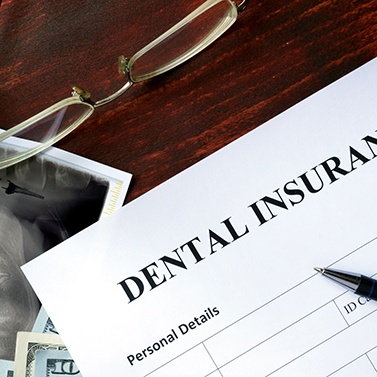
Dental crowns are considered a major procedure, so many dental insurance policies cover roughly 50% of the cost. However, all plans are different, so it’s worth checking your details before getting started. There may also be other restrictions that apply, like a deductible you have to pay before benefits kick in, a designated waiting period, or only a certain number of teeth that can be treated.
Don't hesitate to reach out if you struggle to find the necessary information! Our office staff are familiar with many plans and can help you maximize your available benefits.
Options for Making Dental Crowns Affordable

Our team understands that not everyone carries a dental insurance policy, but we don’t want your budget to keep you from the smile-saving treatments you need to preserve your dental health. If you’re concerned about how to pay for your dental crown, you can apply for flexible financing through CareCredit. If approved, this program allows you to break down your final invoice into more manageable installments that are easier on your wallet.
Dental Crown FAQs
How Long Do Dental Crowns Last?
Modern restorations are made of all-ceramic material because it looks natural and is durable. While they are metal-free, the average porcelain crown will last for 5 to 15 years before needing to be replaced; however, it’s not uncommon for a restoration to last for decades with the right aftercare. You can promote the lifespan of your crown by committing to your oral hygiene at home and visiting your dentist at least twice a year. It’s also best to avoid anything that may damage your crown, like using your teeth as tools or chewing on inedible objects. Dr. Artino recommend's skipping sticky or hard foods to preserve your crown.
How Do I Care for a Dental Crown?
Caring for a crown isn’t much different from your natural teeth. You can brush and floss it like you do your real teeth, but you’ll need to pay a little extra attention when cleaning the edge of the crown. Plaque can get trapped where the restoration meets your gumline, which can lead to decay or infection. Carefully clean around the crown daily to avoid preventable complications. You can also use an antimicrobial mouth rinse to clean any areas your toothbrush and floss can’t reach.
How Much Does a Dental Crown Cost?
There’s not a set fee for dental crowns because everyone’s smile is unique. Various factors affect the amount you’ll pay, such as if you need any prep work and the material used. After examining your mouth and creating a personalized treatment plan, we’ll provide you with an estimate and explain the fees. We’ll also discuss your payment options to find the solutions you need, even if money is tight. Besides traditional payment methods, our office also accepts third-party financing and dental insurance. Rest assured, you’ll know exactly what you’ll have to pay, so you won’t be surprised by any unexpected bills.
Can I Use My Dental Insurance to Pay for a Dental Crown?
Although every policy differs, most dental insurance plans cover crowns when needed for restorative purposes, such as to fix a broken tooth. If the crown is only needed for elective reasons, like to cover a severe stain, your insurance plan may not cover it. We know dental insurance can be confusing, but you don’t have to navigate your policy alone. A member of our team will work on your behalf to file the necessary paperwork, so you have one less thing to worry about. After reaching your annual deductible, your insurance can pay up to 80% of the costs until hitting your yearly limit. If there’s any remaining balance, we will discuss your payment options, like third-party financing.
